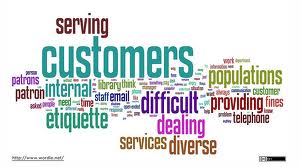Customer Service, Loyalty, and Engagement

Integrity + Trust = Loyalty
In a recent class exercise, I asked my students to describe the level of customer service they had received at various businesses in our city. I was not surprised when I heard comments like "It sucks," or, " It's awful." In the market today, customer service is not at the optimum level for effectiveness. In efforts to embrace automation and cut costs, organizations are moving further away from the important objective of customer retention.
In order to build brand loyalty, a business must build a customer base through effective relationship management. Business relationships, like personal relationships are build on integrity, trust, and loyalty. A company that does not learn to manage these traits is destined to crash and burn because relationships can not exist without them.
Customers really value these three traits in a business. All businesses seem to be aware of the importance of these traits, and many organizations try to implement them as core values. However, the campaign often comes across as superficial. For example, let me use a personal experience to illustrate my point.
Talking the Talk
Two weeks ago, I placed an order with an Internet retailer. I was looking for a specialized product, and this organization was at the top of my Internet search list. When I clicked on the link, I was impressed with what I found. There were glowing testimonials from happy customers and promises from the company itself to fulfill my every expectation. The promotion really made me feel like the company valued my business, so I placed the order.
Within seconds, I received an e-mail confirmation of my order with a promise that I would receive a tracking number. The e-mail was also full of appreciation for my business and reiterated that I was "their first priority." That was the last I heard from the company.
Five days later, I received part of my order. The label indicated that the order came straight from the manufacturer. I figured that the company had this part of the order drop shipped and that the other part of the order would come from the retailer.
When I did not receive the order, I called the retailer's customer service number. The automated system advised me that an associate would be with me in five minutes. For five minutes I listened to recordings telling me how the company "loved" their customers. After five minutes passed, I received another recording telling me that someone would be with me in five minutes. The same recordings played until I was connected with a customer service representative. I explained my issue to the representative who advised me that my "missing" order was not in stock and the order had been canceled.
"Why was I not notified?" I asked.
"I don't know," he said, "someone should have sent you an e-mail."
"I didn't receive one."
He said, "Don't worry, your credit card will not be charged."
I did not become angry with the customer service agent. I said what I needed to say, and ended the conversation politely.
Walking the Walk
I will probably not do business with this company because I received poor customer service. I am not frustrated with the way I was treated on the phone. However, I am frustrated because this particular retailer liked to "talk the talk" but did not "walk the walk."
When I decided to do business with the company, I thought I was dealing with a retail organization that valued me as a customer. I did not realize that my order would be handed off to another company. I do not think the company lied to me, but I think I was blinded by the expectation of good customer service.
Customer service systems are designed to make the customer's experience effective and pleasurable. Therefore, extra care should be given to the way service is being given. If the wait time on a customer service call will be lengthy due to a high volume of calls, be honest about the wait and the reason for the wait. It is a good idea not to give the customer an unrealistic wait time just to make him or her happy.
Too often companies use these tactics to disguise flaws in their business model. It is important to remember that disguises are only temporary fixes. Unless the flaws are fixed, they will rise to the surface and cause harm to the organization. At the end of my personal experience, I was left with a less-than-favorable impression of the company, and I honestly question their integrity.
I am not alone. Many customers will not return to a business if they feel the organization has violated their trust. Trust takes years to build. One small slip can undo years of relationship building. In order, to maintain a customer's trust, a customer service agent should do the following:
1. Greet the customer with a smile. Remembering to be friendly will garner a customer's trust. Remember you represent your company.
2. Do not promise more than you can deliver. If you can not do something, explain to the customer why you can not accommodate their request.
3. If you do not know the answer to a customer's question, find out the answer. Take the customer's phone number or e-mail address and promise to get back in touch if you must do research. Don't make up an answer with the hope that the customer will go away.
4. If you must elevate the issue to another department, give the customer the name of a person to contact in that department. Never "hand-off" the customer to someone else without telling them who you are sending them to and why you must transfer the customer to that person or department.
5. Recognize customers for their loyalty. Repeat customers are the heart and soul of any business.
Being in customer service is difficult; however, a business could not exist without the customer. Therefore, if a business wishes to succeed, it must embrace integrity, trust, and loyalty.








